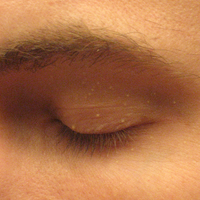Milium (dermatology)
| Milium | |
|---|---|
| Other names | Milia |
 | |
| Milia on the eyelid of an adult | |
| Specialty | Dermatology |

A milium (‹The template Plural form is being considered for merging.› pl.: milia), also called a milk spot or an oil seed,[1] is a clog of the eccrine sweat gland. It is a keratin-filled cyst that may appear just under the epidermis or on the roof of the mouth.[2][3]: 780 Milia are commonly associated with newborn babies, but may appear on people of any age.[4]: 680 They are usually found around the nose and eyes, and sometimes on the genitalia, often mistaken by those affected as warts or other sexually transmitted diseases. Milia can also be confused with stubborn whiteheads.
In children, milia often disappear within two to four weeks. For adults, they may be removed by a physician (a dermatologist has specialist knowledge in this area). A common method that a dermatologist uses to remove a milium is to nick the skin with a #11 surgical blade and then use a comedone extractor to press the cyst out.[5]
See also
[edit]References
[edit]- ^ "What to Know About Milia". WebMD.com. WebMD. 2022-04-22. Retrieved 2023-04-25.
You may hear milia (one is a milium) referred to as milk spots or oil seeds.
- ^ "milium" at Dorland's Medical Dictionary
- ^ Freedberg, et al. (2003). Fitzpatrick's Dermatology in General Medicine. (6th ed.). McGraw-Hill. ISBN 0-07-138076-0.
- ^ James, William D.; Berger, Timothy G.; et al. (2006). Andrews' Diseases of the Skin: Clinical Dermatology. Saunders Elsevier. ISBN 0-7216-2921-0.
- ^ Burnett, Mark E.; Levitt, Jacob O. (2015). "Incision and Drainage (Abscesses, Acne, and Milia)". In Levitt, J.; Sobak, J. (eds.). Safety in Office-Based Dermatologic Surgery. Switzerland: Spring, Cham. pp. 119–128. doi:10.1007/978-3-319-13347-8_13.
